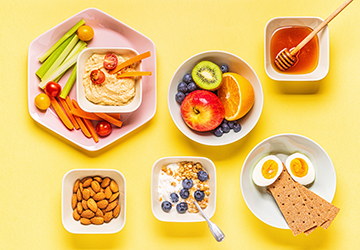After giving birth, postpartum nutrition is essential to a mother's recovery and health. Providing the body with proper nutrients is vital to replenish energy, support breastfeeding when necessary, and promote overall healing. Here's a comprehensive guide to what moms need to know about postpartum nutrition:

1. Calorie Requirements:
After childbirth, a mother's caloric needs increase, especially while breastfeeding. While exact numbers vary, nursing mothers are generally recommended to consume 500 to 600 calories daily to meet their nutritional needs and milk production.
2. Moisturizing:
Adequate hydration is crucial after giving birth. Breastfeeding mothers especially should drink plenty of fluids to ensure optimal milk production. Water, herbal teas, and low-fat milk are great for maintaining fluid balance.
3. Foods Rich in Protein:
Adding protein-rich foods to the postpartum diet is crucial for tissue repair and recovery. Good protein sources include lean meats, poultry, fish, eggs, dairy products, beans, and plant-based protein sources like tofu and quinoa.
4. Iron-Rich Foods:
Many women experience a drop in iron levels during childbirth, leading to postpartum anaemia. Iron-rich foods, such as lean meats, poultry, fish, beans, lentils, fortified grains, and green leafy vegetables, can help replenish iron stores.
5. Calcium for Bone Health:
Calcium is essential for both mother's bone health and the development of the baby's bones while breastfeeding. Dairy products, fortified plant-based milk alternatives, green leafy vegetables, and calcium-fortified foods are all excellent sources of calcium.
6. Fiber Promotes Digestive Health:
Getting enough fibre is essential to prevent constipation, a common postpartum problem. Whole grains, fruits, vegetables, legumes and nuts are excellent sources of fibre, which can support digestive health.
7. Healthy Fats:
Incorporate healthy fats into your diet to support brain function and hormone production. Sources of healthy fats include avocados, nuts, seeds, olive oil, and fatty fish like salmon. The Omega-3 fatty acids in fish oil are especially beneficial for postpartum recovery.
8. Vitamins and Minerals:
Make sure you get a variety of vitamins and minerals. Folate is found in leafy vegetables and legumes and is essential for tissue repair. Vitamin D is necessary for bone health and can be obtained through sun exposure and fortified foods. A balanced diet usually provides the most vitamins and minerals, but some women may need supplements, especially breastfeeding ones.
9. Small But Nutritious Meals:
Eating small, nutrient-dense meals throughout the day can help stabilize blood sugar levels and provide a steady energy source. Add a combination of carbohydrates, protein and healthy fats to each meal to ensure nutritional balance.
10. Avoid Highly Processed Foods and Added Sugars:
Limit your intake of highly processed foods and foods high in added sugars. These substances can cause inflammation and decreased energy and hinder the body's recovery. Instead, focus on nutrient-rich, whole foods.

11. Precautions for Breastfeeding:
When breastfeeding, mothers need additional nutrients to support breast milk production. Consume foods rich in galactagogues such as oats, flax seeds, and fenugreek to increase milk production. Stay hydrated and, if necessary, see a lactation consultant or healthcare provider for personalized advice.
12. Meal Planning and Preparation:
Meal planning and preparation are valuable strategies when considering the demands of caring for a newborn. Prepare nutritious snacks and easy-to-prepare meals in advance to ensure you have healthy options throughout the day.
13. Listen to Your Body:
Pay attention to hunger and satiety signals. It's essential to listen to your body's signals and eat when you're hungry. Trying to follow a strict diet or restrictive eating habits may not be beneficial to the recovery process.
14. Take Care of Postpartum Mental Health:
Nutrition and mental health are closely linked. To improve your mood, eat foods rich in serotonin precursors, such as B. Turkey, eggs, and dairy products. Omega-3 fatty acids in fatty fish and flaxseed are also linked to positive mental health.
15. Consult a Doctor:
Every woman's postpartum experience is unique, and individual nutritional needs may vary. Consult a physician or registered dietitian for personalized recommendations based on your health, dietary preferences, and lifestyle.
Conclusion
Prioritizing postpartum nutrition is essential in maternal care and supports recovery, energy levels, and overall health. Mothers can keep their bodies during this transitional phase by eating nutrient-dense foods, staying hydrated, and focusing on personal nutritional needs. Adequate nutrition supports recovery and provides essential nutrients for breastfeeding mothers to nourish their babies. Seek individual advice from your healthcare professional to ensure a healthy and balanced postpartum nutrition plan.



